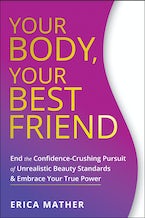By Erica Mather, author of Your Body, Your Best Friend
If you’re in the women’s health and wellness field, or are an eating disorder counselor, chances are high you’ve heard terms like body positivity, body confidence, body acceptance, body neutrality. At times, they’re used rather interchangeably. But they’re not the same! Some land squarely in a political activism realm, while others are slippery, less clearly defined, simply personal, or are currently taking shape. In this blog we’ll sort out what they mean.
Let’s start with body positivity, since it has the longest history, strongest modern traction, and public friction with individuals, brands, and the medical community.
In 1966, Connie Sobczak and Elizabeth Scott founded The Body Positive in response to the death of Sobczak’s sister to an eating disorder, and her own struggle with one.
In 1967, Lew Louderback published his article “More People Should Be Fat,” in it documenting the social struggles of a fat person, the ineffectiveness of dieting, and his ultimate decision to allow his body to simply be the way it was.
The 1960s birthed the Health at Every Size Movement, which observes that the size and shape of the body isn’t always a clear indicator of health.
These milestones and more contributed to the Body Positivity Movement. It was originally an intersectional activist movement, providing a safe place for fat people to get accurate information about dieting, health, social justice, and reform, while also chipping away at the social pressures that mandate thinness and drive eating disorders. Body positivity, fat acceptance, and fat activism went hand, in hand, in hand. As a result, sometimes (but not always!) the phrase body acceptance refers to these movements as well.
Fast-forward to 2020, and body positivity describes dueling positions most visible on social media. In one corner, there’s the fat activism illustrated above, and in the other, the body positivity of #bopo and #fitspo where body positivity is a thin veneer for dieting, diet tips, conventional beauty standards, weight loss and exercise regimes, and self-proclaimed “self-love.”
How did this happen? As fat activism and body positivity gained more visibility, they also became counterculture, and then vogue. As with most trends from the margins (music, fashion, even dieting—think keto, or intermittent fasting, for instance), eventually centrists (both individuals and brands—think Dove’s ten-year “Real Beauty” campaign) assimilate them, and the message becomes confused or diluted.
Tip: When you see media or messaging promoting body positivity, look more closely to see what it’s really advocating. Current sensibilities advise tailoring a personalized body-positive approach to fit the needs of the human at their current developmental phase.
Now, let’s talk about body confidence. Body confidence, self-esteem, and healthy body image are topics that often show up together. Body image is an internal map of your body and your relationship to it that you then project into the world. Body confidence isn’t a political movement, or a social justice sound bite. It operates purely in the realm of self. How do people feel about their bodies? A person can have body confidence and NOT be body positive. A person can be body positive and NOT possess body confidence. While body positivity is a movement that functions in the sociopolitical world, body confidence is entirely an inside job.
Finally, enter body neutrality. The newest approach, it says, “How I feel about myself has nothing to do with my appearance.” In other words, your attitude towards the body is, well, neutral. The most visible figurehead of this recent body image development, actress Jameela Jamil says, “I don’t think about my body, ever,” and calls herself “a floating head.” The body neutrality movement is a corrective, pushing against the mainstreamed body positivity and body love movement, where increasing pressure to love your body, or at least perform loving it, has become the new, often unattainable benchmark for personal success, beauty, and social approval. The movement points out, rightly so, that it simply may be impossible to love your body all the time.
My own concern with these movements is that, unfortunately, they still objectify the body. Whether the body is central to the narrative (body positivity) or removed completely (body neutrality), one way or another it’s still an object whose value is either overblown or erased. Whether the value is “a lot” or “zero,” we’re still trading on it.
But a body isn’t an object. A body is an invaluable, intelligent, living, and conscious entity with a very long memory. Within our bodies we, our selves—whatever you define as “self”—reside.
In pointing this out, I don’t intend to ignore or bypass the realities of our currency-based culture. No! Socioeconomic and political forces are fact, and have tangible impacts in the real lives of our bodies. The personal is political and it plays out on our sweet, innocent bodies.
That being said, my own approach toward the body and body image is one that I’ve not seen in the current conversation. It’s mystical; it’s spiritual. It asks the question, what does my body have to do with the great and purposeful work of my life? Perhaps even more importantly, it takes the body as a central ally and wisdom-keeper in the answers to all your big and mysterious life lessons.
What would YOU call this kind of an approach? Let’s coin a term! We’re interested in hearing your ideas; write in with comments and tell us.
You might wonder how this approach fits with the others. I think of it as an addendum. Viewing the body as organic, mystical, and spiritual, doesn’t negate the helpful work of body positivity and body neutrality. Instead, I hope this additional perspective can temper objectification and enrich a person’s relationship with their body, no matter where they are in their personal journey of inner development and outward action. And, I also hope clarity about the terms and any insights you’ve had are enriching tools for you to use in both professional and personal body image discussions.
Erica Mather is founder of the Adore Your Body system for overcoming body image challenges, and of The Yoga Clinic of New York City. Mather is a recognized body image expert and a Forrest Yoga lineage holder.



 2024 Peace Playbook: 3 Tactics to Avoid Clashes with Your Partner
2024 Peace Playbook: 3 Tactics to Avoid Clashes with Your Partner